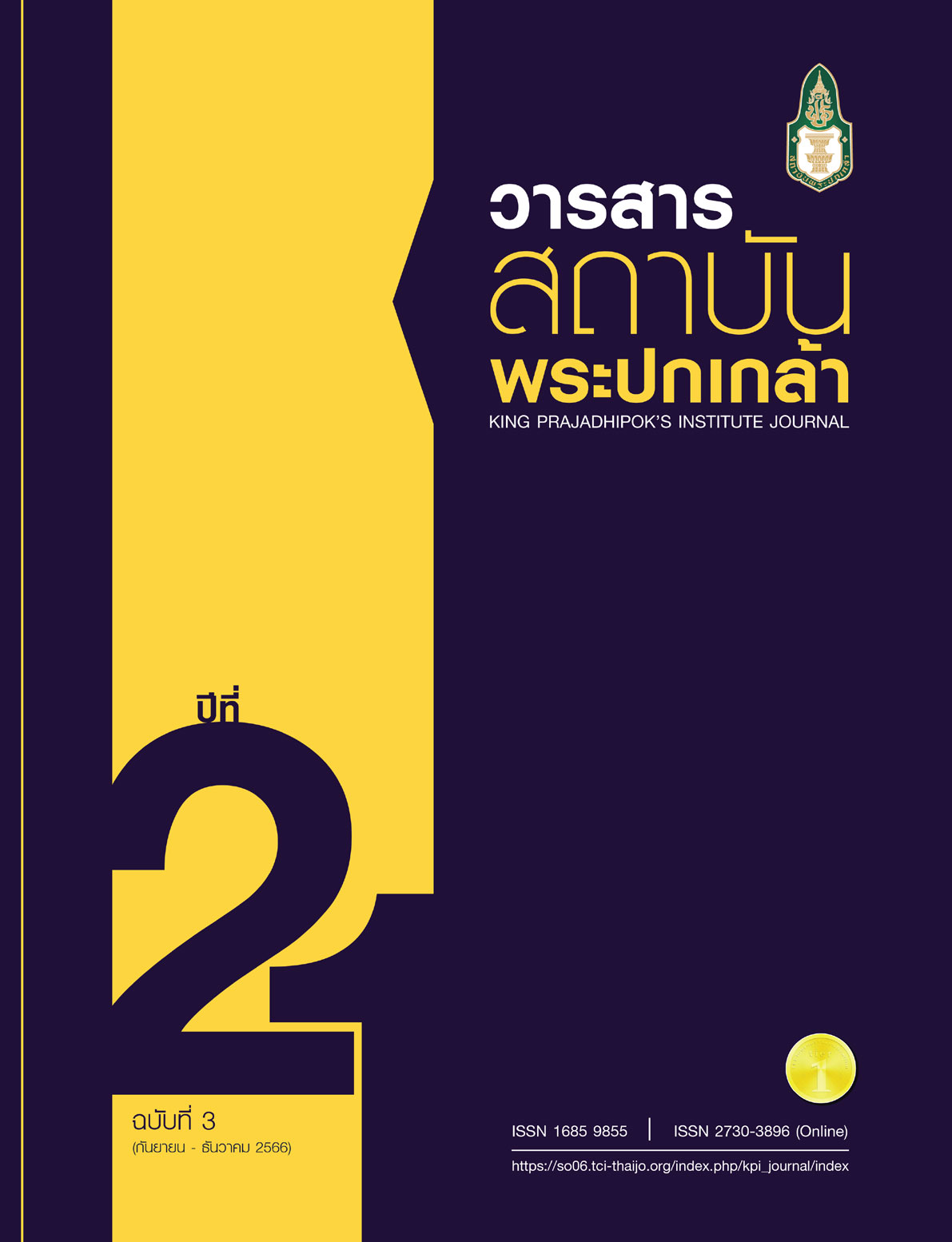The Development of Citizen Networks Under the Democratic Monarchy for Volunteer Groups in Thepalai Sub-District, Kong District, Nakhon Ratchasima Province
Main Article Content
Abstract
The objectives of this research were 1) to study the problems and obstacles in the development of citizenship networks, 2) to study the methods of solving problems and obstacles in the development of citizenship networks, and 3) to study the approaches for developing citizenship networks under the democratic monarchy, with the King as head of the state. The study area focused on Thepalai Sub-District, Kong District, Nakhon Ratchasima Province. The sample group was 40 village health volunteers using participatory action research.
The research results revealed that 1) the causes of problems and obstacles were the community leader's lack of knowledge and understanding of fundamental laws, lack of publicizing on the role of citizenship under the constitution, and lack of promotion of public participation in citizenship. Regarding an online society, there is no report to the police on distorted and false information to the King's Institute due to fear of being a threat to their families. 2) To solve problems and obstacles, the government agencies and educational institutions in the area must continuously promote citizenship networking to the people in the community, expand the knowledge of active citizenship to people who are not participating in the project, and provide online communication's channel together with people in the community. These will increase the number of members in the networks and also provide a participatory meeting forum using the A-I-C process. 3) guidelines for a developing citizenship network under the democratic monarchy are followings: community's leaders and people in the community must be self-reliant and implement the philosophy of King Rama IX's sufficiency economy into their life, respecting the laws, rules and regulations of the community, agreeing to resolve conflicts in the community with the principles of compromise, learning to accept on majority's consensus of the community, praising those who do good for community, including those who show respect for the law and honour the King's institute, organizing an exhibition that shows the history and behaviour of a role model who obeys the law, respectfully act to the King's institute, promoting a public volunteer's system monitor that observe the government agencies’ works in the area, and also live broadcasting local council's meetings through various channels in the community, encouraging representative’s public sectors to gain more knowledge and understanding of the regulations on procurement and rules of preparation planning. These will correctly check through the work of the local authorities.
Article Details

This work is licensed under a Creative Commons Attribution-NonCommercial-NoDerivatives 4.0 International License.
@ 2020 King Prajadhipok's Institute The Government Complex Commemorating All Right Reserved.
References
ภาษาไทย
กรมส่งเสริมการปกครองท้องถิ่น. (2564). การเมืองการปกครองในระบอบประชาธิปไตย. สืบค้นจาก http://www.dla.go.th/work/e_book/eb7/eb7_4/p1.pdf
กิติพัฒน์ นนทปัทมะดุล. (2558). การศึกษาระบบอุปถัมภ์กับปัญหาสังคมไทย: การประยุกต์ใช้ของนักสังคมสงเคราะห์วิชาชีพ. วารสารสังคมสงเคราะห์ศาสตร์, 23(1), 177-197.
ฐานริณทร์ หาญเกียรติวงศ์ และคณะ. (2563). ระบบอุปถัมภ์กับปัญหาความยากจนในประเทศไทย. วารสารวิชาการสังคมศาสตร์เครือข่ายวิจัยประชาชื่น, 2(3), 1-14.
ทิศนา แขมมณี. (2542). รูปแบบการเรียนการสอนทางเลือกที่หลากหลาย. กรุงเทพฯ: สำนักพิมพ์แห่งจุฬาลงกรณ์มหาวิทยาลัย.
นิภาพรรณ เจนสันติกุล. (2556). โครงสร้างทางสังคม บทบาทและนโยบายสาธารณะกับความเป็นพลเมือง. วารสารศิลปศาสตร์, 5(1), 49-62.
บงกช สุทัศน์ ณ อยุธยา. (2557). การสร้างจิตสำนึกของความเป็นไทย ค่านิยมเพื่อการต่อต้านป้องกันการทุจริต คอร์รัปชัน. วารสารศรีนครินทรวิโรฒ วิจัยและพัฒนา สาขามนุษยศาสตร์และสังคมศาสตร์, 6(11), 248-264.
ปริญญา เทวานฤมิตรกุล. (2555). การศึกษาเพื่อสร้างความเป็นพลเมือง. กรุงเทพฯ: นานมีบุ๊คส์
พับลิเคชันส์.
ประสิทธิ์ ลีระพันธ์. (2564). ปรับฐานการวิจัย: แนวคิดและกระบวนการปฏิบัติการ. สืบค้นจาก
http://203.157.168.42/bspp/uploads/download/20170809014418528.pdf
ผู้จัดการออนไลน์. (2565). ม็อบปลดแอกโผล่หน้าย่าโม ทวงคืนประชาธิปไตยอ้างคนโคราชไม่ทน เรียกร้อง
ข้อ. สืบค้นจาก https://mgronline.com/ local/detail /9630000076190
ราชกิจจานุเบกษา. (2565). รัฐธรรมนูญแห่งราชอาณาจักรไทย พุทธศักราช 2560. สืบค้นจาก
www..soc.go.th › PDF › 2560 › 1.PDF
พยุงศักดิ์ จันทรสุรินทร์. (2541). การพัฒนาคุณธรรมจริยธรรมในระบบการศึกษาไทยท่ามกลางการเปลี่ยนแปลงของสังคม. ใน เพชราภรณ์ รื่นรมย์, (บรรณาธิการ). คำบรรยายเกี่ยวกับแนวคิดและทฤษฎีในการพัฒนาคุณธรรมจริยธรรมที่เน้นความมีวินัยและความมีประชาธิปไตย (น. 1-5). (พิมพ์ครั้งที่ 3). กรุงเทพฯ: กรมวิชาการ กระทรวงศึกษาธิการ.
พระมหาไทยน้อย ญาณเมธี และพระศิลาศักดิ์ สุเมโธ. (2562). รัฐกับการเสริมสร้างความเป็น
พลเมืองในระบอบประชาธิปไตยไทย. วารสารมณีเชษฐาราม วัดจอมมณี, 2(1), 79-93.
วิชัย ตันศิริ. (2565). รัฐธรรมนูญของประเทศตะวันตกและไทย : กรณีศึกษาทางประวัติศาสตร์และกฎหมาย. สืบค้นจาก https://www.fpps.or.th/elibrary/download/book41.pdf
ศักดิภัท เชาวน์ลักษณ์สกุล และยุพา ปราชญากูล. (2561). รัฐประหารกับการเมืองไทย. วารสารบริหารธุรกิจและสังคมศาสตร์ มหาวิทยาลัยรามคำแหง, 1(3), 17-34.
สมบัติ ธำรงธัญวงศ์. (2554). การเมือง : แนวความคิดและการพัฒนา. (พิมพ์ครั้งที่ 19). กรุงเทพฯ:
เสมาธรรม.
สำนักงานคณะกรรมการข้าราชการพลเรือน (สำนักงาน ก.พ.). (2563). คู่มือคำอธิบายและตัวอย่างพฤติกรรม
ตามมาตรฐานทางจริยธรรมสำหรับเจ้าหน้าที่ของรัฐ. กรุงเทพฯ: สำนักงาน ก.พ.
เอนก เหล่าธรรมทัศน์ และวลัยพร รัตนเศรษฐ. (2557). รัฐประศาสนศาสตร์พลเมือง. กรุงเทพฯ: สำนักพิมพ์มหาวิทยาลัยธุรกิจบัณฑิต.
ภาษาอังกฤษ
Almon, Gabriel & Powell, Bingham. (1976). Comparative Politics Today. Boston: Little, Brown and Company.
Weiner, Myron. (1971). Political Participation: Crisis of The Political Process. In L. Binder & others, Crisis and Sequences in Political Development (pp.159-204). New Jersey: Princeton University Press.


